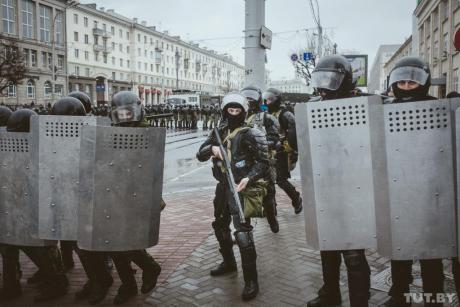
Tens of thousands of people—many of them peaceful protesters—have been arbitrarily detained in Belarus over the past two and a half years, UN Deputy High Commissioner for Human Rights Nada Al-Nashif said March 21. The charge came as Al-Nashif presented a report outlining rights violations in Belarus to the UN Human Rights Council, focusing on events leading up to and following the contested 2020 Belarusian presidential election and the ensuing protests. The report presents evidence of the unlawful deaths of at least five people, 100 or more cases of sexual and gender-based violence, as well as widespread unnecessary and disproportionate use of force, attacks on independent media, and unfair sentences that the report calls “politically motivated.”
The report also urges the overturn of several oppressive legislative amendments, including one that allows the termination of citizenship of those who “participat[e] in extremist activities or caus[e] serious harm to the interests of the Republic of Belarus.” Al-Nashif commented:
The notion of “extremism” is defined too broadly in national legislation… [T]here were many criminal cases in 2022 by the [Belarusian] Prosecutor General’s Office based on allegations of “extremism.” These amendments, which provide broad license for abusive repression and open the door to statelessness, should be revoked.
Another concern raised in the report is the broadened scope of the death penalty to include offenses that would not qualify under international standards.
Al-Nashif called on UN member states to use legal measures to hold Belarus accountable:
Prompt, effective, transparent and independent investigations must be launched into all past human rights violations, with provision of adequate remedies, including due accountability for perpetrators. Given the current circumstances of limited accountability prospects in Belarus, other Member States should also consider working towards accountability through national proceedings, based on accepted principles of extraterritorial and universal jurisdiction, consistent with international due process and fair trial standards.
The report is not the first of its kind. In March 2022, the High Commissioner’s office released its first report on the human rights situation related to the contested 2020 election. That report documented the use of unnecessary crowd-control weapons on protestors, some 5,000 complaints of ill-treatment of detainees, and trials that failed to uphold basic procedural guarantees.
Release of the new report follows a statement from High Commissioner Volker Türk last week calling for an end to human rights abuses in Belarus.
From Jurist, March 22. Used with permission.
Photo Libcom.org





Belarus: rights activist gets seven years in penal colony
A Belarusian court sentenced Nasta Loika, founder of the human rights organization Human Constanta, to seven years in a penal colony on June 20. The court found Loika guilty of “inciting social hatred” for her reports on police abuses. The trial was closed to media and had only limited public viewing space available.
UN Special Rapporteur on Human Rights Defenders Mary Lawlor condemned the sentencing, saying, “This appalling verdict is a new step in Belarus’ crackdown on civil society & HRDs.” (Jurist)